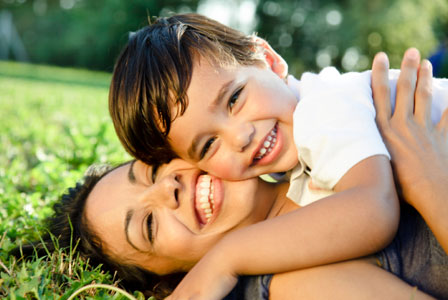
Have you ever been out in public and someone really ticked you off? But your child was with you, so you bit your tongue?
Teaching your child how to deal
Truth is, shouldn't we be able to handle ourselves -- and our conflict -- the same in front of our children as we would without them? Give-or-take a curse word, of course. We asked experts to give us a lesson in conflict resolution 101 -- and the basics we should teach and show our kids.
It's hard to be a good role model...all the time
Your children are always watching you. They're constantly taking cues from you about everything from distinguishing right from wrong, to how to interact with people. But when it comes to emotions -- you know, when those hot buttons are triggered -- it's not always easy to do or say the right thing, even when those little eyes and ears are watching and listening.
"In an ideal world, we would handle conflict the same way whether our kids are watching or not, right? Clean language, strong posture, good eye contact, respectful but firm words. In the heat of the moment, it is hard to argue with someone in the way that we might wish we had afterwards. Our children can be a great motivator to help us strive for that ideal!" says Deborah Gilboa, MD.
When deciding how to respond to conflict, ask yourself two questions
So what do you do when you find yourself smack in the middle of a potential battle? You're not looking for a fight, you're simply shopping, seeing a movie or out to dinner, but you encounter a person who does something that rubs you the wrong way. Or maybe you're the culprit -- you do or say something that makes another person upset. And your child is there to witness the event. Kristi Fowler, LMFT says there are two questions that need to be answered in your head before responding to the conflict:
- Is this person offending you or your family?
- Is this just an annoyance?
"Is the answer to the first question is 'yes,' then it doesn't matter if your child is with you  you need to respond. The key is standing up for the right thing, not just entering conflict for conflict sake. If you do, Âespecially in front of your child, Âyou accomplish a couple of things: 1) You protect your family and in so doing, make your child feel safe; and 2) You model to your child how to stand up for what is right."
Biting your tongue can be hard, but it's the right thing to do
Fowler suggests these tips for addressing conflict in public:
- Stay calm. Messages delivered in a calm, cool fashion get their point across much better.
- Address the issue directly without character assassination.
- Act in the exact ways you would expect your child to act.
You don't have to shy away from conflict. You can still stand up for yourself by taking the higher road and not attacking the other person.
Most people will agree that many of these tips are easier said than done. When you're in the heat of the moment, it can be difficult to take a step back and breathe. But if you remember that your child will eventually find himself in a conflict, and could look back on this encounter as his model of what to do, it may help you do a better job of biting your tongue. Because in the end, what's more important, reading Susie Q the riot act or teaching your child that conflict can be handled without aggression?
Teach your child that conflict has a goal
When you're in a conflict with another person, it's also important to ask yourself what you want the outcome to be. Simply being mad and letting your anger take over isn't going to get you anywhere . Gilboa adds that it's important to teach our children that conflict should have a goal. "So first, we need to figure out what we hope to accomplish. Do we need the other person to do something, like give us money back, move their car, stop smoking in the seat next to us? Do we just want the other person to understand how we feel? Or do we want them to handle the same situation differently in the future?"
Teaching kids to handle fights with friends >>
Read more about teaching your kids conflict resolution
How to teach your kids to fight fair
Teaching your kids about forgiveness
How to explain to your kids why parents fight